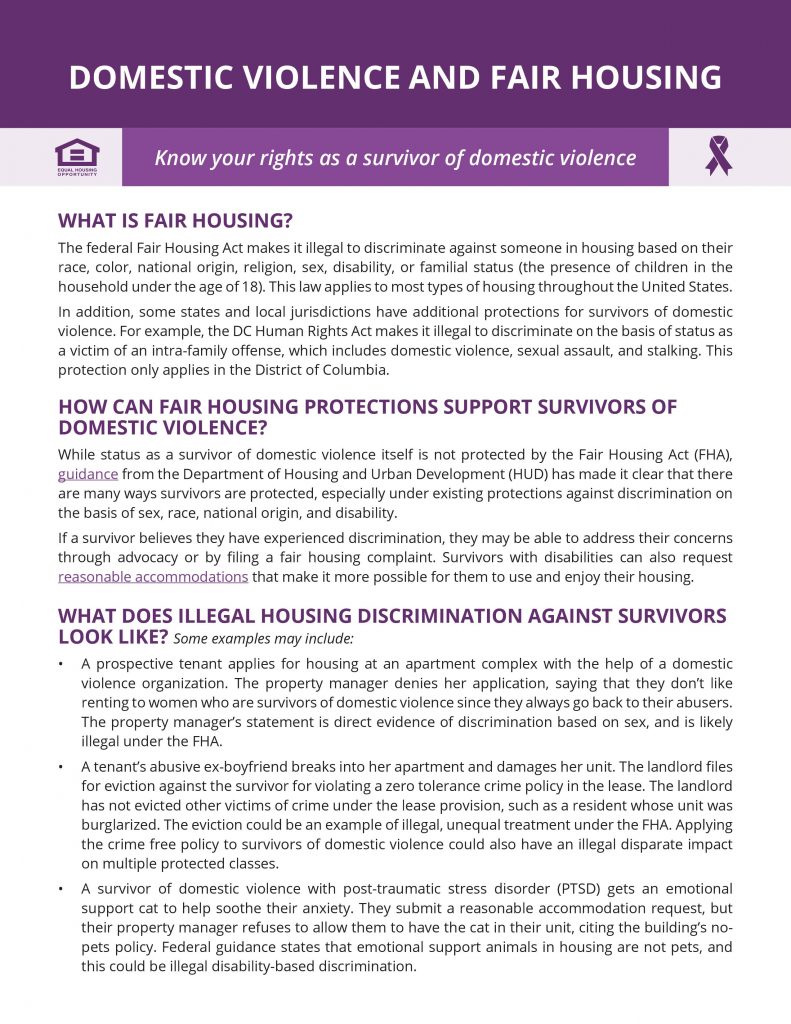Housing Discrimination Shouldn’t Be Another Roadblock for Survivors of Domestic Violence
By Aastha Uprety
October 2, 2019
October is Domestic Violence Awareness Month. Survivors of domestic violence need safe places to live, but discrimination can make it difficult to secure stable housing. While status as a survivor of domestic violence itself is not protected by the Fair Housing Act (FHA), guidance from the Department of Housing and Urban Development (HUD) has made it clear that there are multiple ways that fair housing protections can extend to survivors. To help provide information about these protections to survivors and their advocates, the ERC is releasing a know-your-rights fact sheet on fair housing protections for survivors of domestic violence, included here.
 Domestic violence is a major cause of homelessness. A 2013 survey found that 15 percent of people experiencing homelessness were survivors of domestic violence, and a 2005 study found that 1 in 4 homeless women became homeless after experiencing violence. Often, the lack of alternative housing opportunity prevents people from leaving abusive relationships. Leaving an abusive home could mean facing homelessness, especially if affordable housing is not available. In the District of Columbia, one of the primary reasons that survivors stay with their abusers is the lack of affordable housing. Furthermore, facing abuse at home can lead to eviction. Undoubtedly, even after leaving an abusive partner, the lasting effects of trauma can lead to lifelong challenges and discrimination.
Domestic violence is a major cause of homelessness. A 2013 survey found that 15 percent of people experiencing homelessness were survivors of domestic violence, and a 2005 study found that 1 in 4 homeless women became homeless after experiencing violence. Often, the lack of alternative housing opportunity prevents people from leaving abusive relationships. Leaving an abusive home could mean facing homelessness, especially if affordable housing is not available. In the District of Columbia, one of the primary reasons that survivors stay with their abusers is the lack of affordable housing. Furthermore, facing abuse at home can lead to eviction. Undoubtedly, even after leaving an abusive partner, the lasting effects of trauma can lead to lifelong challenges and discrimination.
There are various methods by which the FHA protects survivors of domestic violence from discrimination. Firstly, it is illegal for a housing provider to explicitly discriminate against one or more of the seven protected classes: race, color, religion, national origin, sex, disability, and familial status. For example, if a landlord states that they do not rent to women with a history of domestic violence because they always go back to their abusers, this would likely be illegal discrimination on the basis of sex. This is an example of blatant sex discrimination because the landlord stated a policy that only applies to women. Secondly, it is illegal for a housing provider to unequally apply a policy to different groups or enforce a policy in a discriminatory manner. If a landlord has a zero-tolerance crime policy in which households where crimes occurred were evicted, but only enforced it against survivors of domestic violence and not their abusers, this would also likely constitute illegal sex discrimination.
While domestic violence impacts people across many communities, certain groups of people are statistically more likely to experience domestic violence. Data shows that some groupss, including women (sex), people of color (race), immigrants (national origin), and people with disabilities (disability), that are explicitly protected under the FHA, are more likely to experience domestic abuse. For example, in 2016, almost half of survivors of domestic violence in Maryland were African American despite African Americans constituting only 30% of the state’s population. As such, a housing related policy that discriminates against survivors would disproportionately impact one or more of these groups, which could be illegal under the FHA.
It is also critical to remember that the FHA offers certain protections to people with disabilities. People with disabilities are both more likely to experience domestic abuse, and survivors often experience disability caused by domestic abuse. Under the FHA, people with disabilities have the right to request reasonable accommodations and modifications. Reasonable accommodations are changes in rules, policies, or practices that help make it easier for a person with a disability to fully use and enjoy their home. A reasonable modification is a change to the structure of a unit to achieve the same goal. For example, a survivor of domestic violence could have an emotional support animal to help soothe their PTSD symptoms. Keeping this emotional support animal in a no-pets building would be considered a reasonable accommodation. This toolkit from the ERC discusses reasonable accommodations and modifications in more depth and explains how to submit requests for them.
Finally, some local jurisdictions may have additional protections in place for survivors of domestic violence. In Washington, D.C., the D.C. Human Rights Act prohibits discrimination against additional protected classes not covered by the FHA, including status as a victim of an intra-family offense, which includes domestic violence, sexual assault, and stalking. This protection only applies in the District of Columbia, but offers an important roadmap to other jurisdictions interested in improving outcomes for survivors.
Survivors of domestic violence deserve safe and secure housing, but housing discrimination is a roadblock to achieving this goal. This October, let’s recommit to using fair housing as a tool to advocate for survivors of domestic violence.
——-
Last year, the ERC published a blog about how overly-broad criminal records background checks can make it harder for survivors of domestic violence to find housing.
If you believe you may have experienced discrimination in housing, you can contact the Equal Rights Center. To report your experience, please call 202-234-3062 or email info@equalrightscenter.org.

